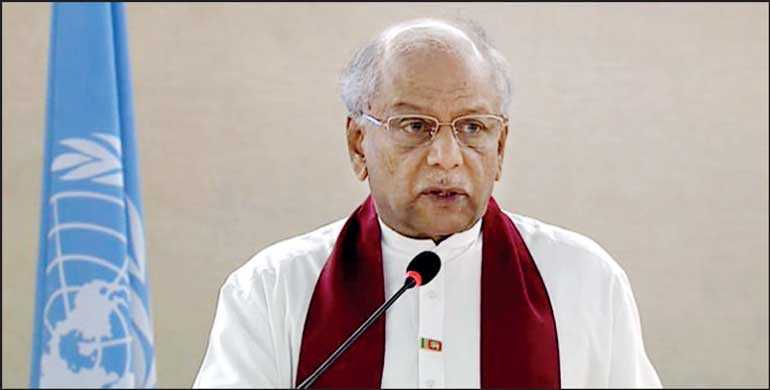Monday Feb 23, 2026
Monday Feb 23, 2026
Thursday, 27 February 2020 00:00 - - {{hitsCtrl.values.hits}}

Foreign Relations Minister Dinesh Gunawardena yesterday formally announced Sri Lanka’s withdrawal from the United Nations Human Rights Council (UNHRC) Resolution 30/1 and others adopted after 2015, but assured members the Government is committed to “comprehensive reconciliation”, delivered through a domestic mechanism.
Delivering his address to the UNHRC in Geneva, the Minister emphasised that the decision to withdraw was made according to the wishes of the people of Sri Lanka, while following a non-aligned, neutral foreign policy.
“Our Government is committed to examining issues afresh, to forge ahead with its agenda for ‘prosperity through security and development’, and to find home-grown solutions to overcome contemporary challenges in the best interest of all Sri Lankans,” he told the Council. “It is in this context that I wish to place on record Sri Lanka’s decision to withdraw from co-sponsorship of Resolution 40/1 on ‘Promoting reconciliation, accountability and human rights in Sri Lanka’, which also incorporates and builds on preceding Resolutions 30/1 of October 2015 and 34/1 of March 2017.”
Gunewardena charged that the resolutions bound the country to carry out “this experiment, which was impractical, unconstitutional, and undeliverable, despite strong opposition and evidence that many of the undertakings couldn’t be carried out, merely to please a few countries.”
He also said constitutionally, the resolution seeks to cast upon Sri Lanka obligations that cannot be carried out within its constitutional framework, and infringes the sovereignty of the people of Sri Lanka and violates the basic structure of the Constitution. He insisted this is another factor that prompted Sri Lanka to reconsider its position on co-sponsorship, stating procedurally, “in co-sponsoring Resolution 30/1, the previous Government violated all democratic principles of governance.”
“No one has the well-being of the multi-ethnic, multi-lingual, multi-religious and multicultural people of Sri Lanka, closer to their heart, than the Government of Sri Lanka. It is this motivation that guides our commitment and resolve to move towards comprehensive reconciliation, and an era of stable peace and prosperity for our people. It is therefore our strong conviction that the aforementioned actions within the framework of Sri Lanka’s domestic priorities and policies, are not only realistic but also deliverable. We call upon all stakeholders, within and outside this august body, to cooperate with Sri Lanka, in this endeavour,” he added.
Gunawardena noted no Cabinet approval had been given for Resolution 30/1, Parliament was not consulted, and even former President Maithripala Sirisena professed himself unaware of its contents. He argued that the resolution moved Sri Lanka away from its traditional stance of neutrality and made it a “pawn” in global politics.
“Most seriously, it is seen that the dictated changes in the country pursuant to 30/1, undermined the national interest and compromised national security, including weakening national intelligence operations and related safeguards, which are deemed to have contributed to the lapses that resulted in the Easter Sunday attacks in April 2019, which targeted churches and hotels, resulting in loss of life, including those of foreign nationals, which poses challenges to our Government to restore national security.”
The Foreign Relations Minister stressed that despite withdrawing from co-sponsorship of Resolution 30/1, Sri Lanka remains committed to achieving the goals set by the people of Sri Lanka on accountability and human rights, towards sustainable peace and reconciliation.
“To this end; Firstly, the Government of Sri Lanka declares its commitment to achieve sustainable peace through an inclusive, domestically designed and executed reconciliation and accountability process, including through the appropriate adaptation of existing mechanisms, in line with the Government’s policy framework.”
“This would comprise the appointment of a Commission of Inquiry (COI) headed by a Justice of the Supreme Court, to review the reports of previous Sri Lankan COIs which investigated alleged violations of Human Rights and International Humanitarian Law (IHL), to assess the status of implementation of their recommendations and to propose deliverable measures to implement them keeping in line with the new Government’s policy.”
Secondly, he said the Government will also address other outstanding concerns and introduce institutional reforms where necessary, in a manner consistent with Sri Lanka’s commitments, including the 2030 Sustainable Development Agenda (SDGs). “We will implement policies rooted in the Government’s commitment to the people by advancing individual and collective rights and protections under the law, ensuring justice and reconciliation and addressing the concerns of vulnerable sections of society. A discussion has already been held between the President and the UN Resident Coordinator where it has been agreed to connect the relevant UN agencies to help the Government of Sri Lanka in the implementation of the SDGs.”
Thirdly, Sri Lanka will continue to remain engaged with, and seek as required, the assistance of the UN and its agencies including the regular human rights mandates/bodies and mechanisms in capacity building and technical assistance, in keeping with domestic priorities and policies. Finally, in conjunction with all members of the UN, Sri Lanka will seek to work towards the closure of the Resolution, he said.